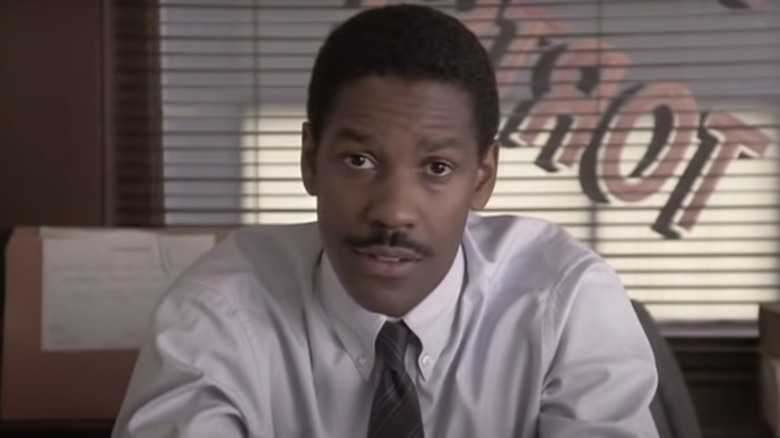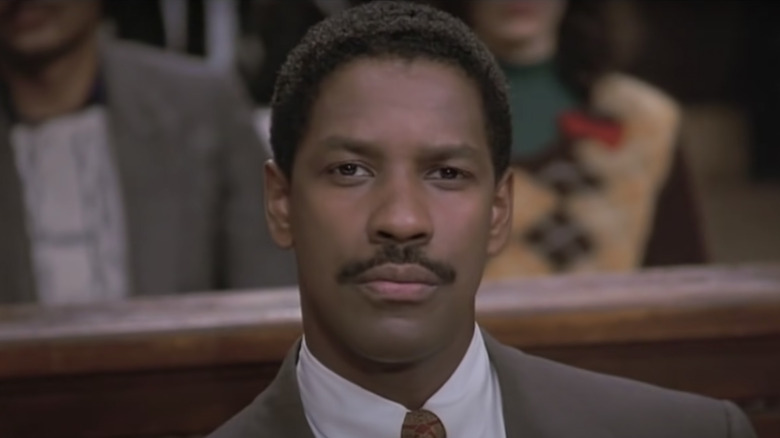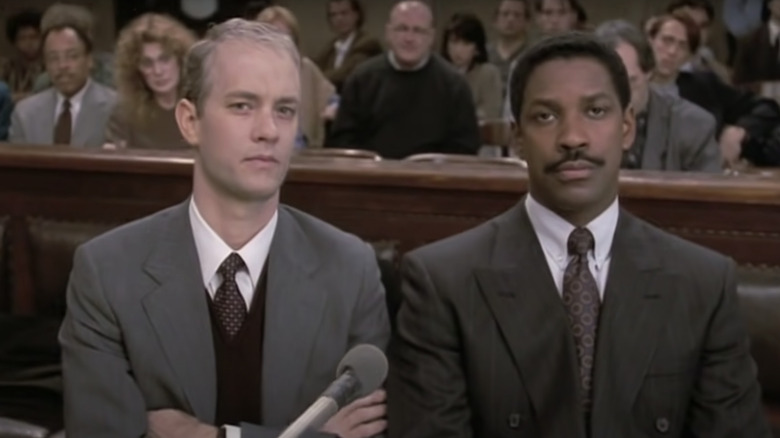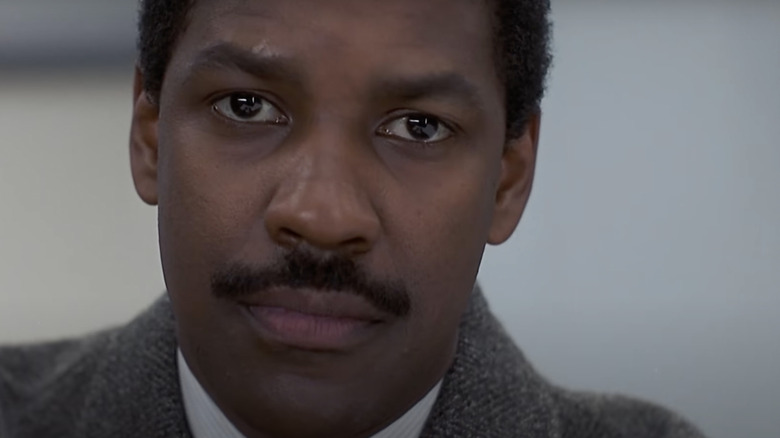It Took A Stroke Of Luck For Denzel Washington To Star In Philadelphia
"Philadelphia" isn't the kind of movie you put on if you want to giggle and escape from the real world. It's a reality punch right in the kisser, and Denzel Washington delivers the knockout blow.
Between 1981 and 1990, AIDS took the lives of 100,777 people. These tragedies are compounded by the fact that, for a while, AIDS also robbed our society of love, understanding, and compassion. During the AIDS epidemic, HIV-positive people were ignored by the health care system, banned from school, and fired from their jobs.
These real-life events inspired the story of "Philadelphia."
The film follows Andrew Beckett, a young, successful attorney who hides his homosexuality and HIV-positive status from his employer. When a lesion reveals his secret condition, Beckett is fired, which leads him to sue for discrimination. The only attorney who will take his case is Joe Miller, a homophobic man who admits he's afraid of HIV-positive people.
With friends like that...
While the goal was to change the hearts and minds of its audience, director Jonathan Demme would have to confront some of his own assumptions and prejudices behind the scenes when Denzel Washington wanted in on the project.
Fate's a funny thing
With heavy subject matter like homophobia, justice, and AIDS, Demme knew he would have to pick his cast carefully. He thought the Miller character would function as comic relief, comforting the audience by distracting them with laughter. In an interview with Oregon Live, Demme explained his thought process about the casting of Joe Miller:
"...We [were] gonna have such a struggle to get people to see an AIDS movie, we were hoping to cast it with someone who, right out of the box, the mention of their name signals to people that there's gonna be a lot of humor in this movie ... specifically I was hoping for either Robin Williams or Bill Murray to play Joe Miller."
Fate would have other plans.
As Demme details in the interview, one of the movie's producers would end up on a plane beside Denzel Washington and allow him to read the "Philadelphia" script. Right away, the actor was interested in the Joe Miller character. When Demme found out about Denzel's interest in the role, he hesitated. Although Washington was already popular for his work in "The Pelican Brief" and "Malcolm X," he wasn't known for filling movies with comic relief, which Demme and the producers felt the film needed.
Days after the serendipitous plane ride, Demme would call Washington to discuss the role, and explain his belief that the character needed to provide laughs for the audience. When presented with this challenge, Washington simply replied, "Well, I happen to be very, very funny."
Spoiler alert: Joe Miller is not funny. He's real, and that's what Washington brought to the film: the stark reality of prejudice and homophobia.
At the beginning of the movie, Miller is far from open-minded or accepting. When he finds out Beckett has AIDS while shaking his hand, he quickly ends the handshake and practically jumps away as far as he can in his tiny, cramped office. He refuses to take Beckett's case "for personal reasons." Later, in a conversation with his wife, we find out the "personal reason" is that he doesn't like gay people. Later, when a young law student believes Miller is gay and asks him out for a drink, Miller responds by grabbing the man by the collar and calling him a slur.
To say the character is unlikeable would be an understatement, but Washington makes his journey from bigot to ally relatable.
"We don't live in this courtroom"
By the end of "Philadelphia," Joe Miller shows he audience that change is possible. Miller and Beckett bond over the course of the film, with Miller coming to recognize and empathize with the discrimination the LGBTQ community faces. Miller's character arc is what makes "Philadelphia" so relatable and powerful: Washington's portrayal allows for the audience to recognize their own prejudices in the character, providing a model for change.
At its core, "Philadelphia" is about being honest about difficult topics. When the defense attempts to skirt the issue of Beckett's homosexuality, labeling him an irresponsible employee, Miller knows he has to bring the issue of Beckett's sexuality "out of the closet." After giving an impassioned speech about how everyone involved in the courtroom is secretly obsessed with sex and sexual orientation, the judge responds with the typical script, "In this courtroom, Mr. Miller, justice is blind to matters of race, creed, color, religion, and sexual orientation." Washington replies with the painful truth, "With all due respect, your honor, we don't live in this courtroom though, do we?"
The writing in this scene alone makes it gripping and memorable. We watch as Miller is forced to accept his contribution to what he calls a "climate of hatred and fear" in society surrounding AIDS and homosexuality. We know how Miller really feels homosexuals and AIDS, how he talks about them in private — but here, he admits his own bigotry out loud and confronts it. The first step, after all, is admitting you have a problem.
Demme's original call for a comedic performance was clearly wrong, and a more serious, potentially even offensive, approach was what the role really needed. Clearly, Washington knew that, and made the character much more than the funny guy, but that wouldn't be the only thing he would change about Demme's original vision of his character.
Demme was certain Joe Miller had to be a white man.
In that same phone call with Washington, Demme discussed the race of the character, saying:
"'And I was like, well, Denzel, if you were to play this part, do you think we'd have to do any rewriting on the basis of the different race than what was originally envisioned?' And he said, 'Do you?' And I heard myself say, 'No, I don't.' And he said, 'Me neither.'"
Demme doesn't explain why he had this sudden change of heart in that phone call with Washington, but he later admitted it taught him "a big lesson."
Universal appeal
Demme's initial vision for the "Philadelphia" character focused on his need to make Joe Miller appealing to a large audience — after all, how many hearts and minds can you change if nobody is interested in your cast or watching your movie? To Demme, at the time, universal appeal meant a funny, recognizable, white guy, but the success of "Philadelphia" would prove this assumption wrong.
In a 2017 interview, Washington would explain what he feels makes stories appealing to wide audiences, saying:
"The thing about great writing...[is that] there are so many layers. It's not just one thing. What you see...or how you feel...has to do with your own life. Themes are universal."
Washington's honest, sometimes brutal portrayal of Miller, along with themes of injustice and equality, is what captured the attention of wide audiences the way Demme wanted.
"Philadelphia" was nominated for five Oscars and won two of them, which included a best actor win for Tom Hanks. Washington did not see any awards for his portrayal of Joe Miller, but Hanks didn't take his contribution to the film for granted. He openly admitted in his Oscar speech that he felt like he had to share the win with Washington. In reality, I feel like it should be the other way around.
Like most of America, I love Tom Hanks, and he was great as Andrew Beckett, but Washington outshines him in "Philadelphia." It takes a very talented actor to make a character like Joe Miller relatable, even likable, but he does just that.
I can't imagine anybody else playing that character as well as he did. His sometimes sarcastic, but always biting courtroom speeches, his journey from fear to understanding — Washington brought a unique appeal to all of it. The thought of a comedian like Robin Williams or Bill Murray taking his place seems utterly ridiculous. I think that movie would have tanked and a huge opportunity to change opinions on AIDS and the issues surrounding it would have been lost.
In the end, it wasn't the comedic chops or the race of Joe Miller that appealed to the audience — it was Washington's ability to make the character raw and flawed, yet relatable.



